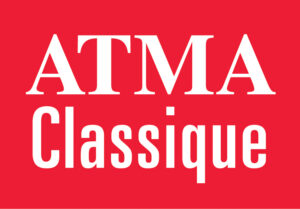MUSIC FOR A WHILE : Marie Nadeau Nadeau-Tremblay, violin
ATMA chats with musicians about their lives in the time of coronavirus. Part of our ongoing series of interviews with musicians during the pandemic: a conversation with violinist and artistic director of Les Barocudas, Marie Nadeau-Tremblay.
Recipient of numerous awards and scholarships from McGill University, and a four-time winner of the prestigious Mary McLaughlin Award, Marie also received a scholarship from Early Music America in 2017. In 2019, she was named to the Mathieu Duguay International Early Music Competition’s Honour Roll four times — for First Prize, Audience Prize, Montreal Baroque Festival Prize and the Été musical de Barachois Prize. Known for their refreshingly unconventional approach to early music interpretation, her trio Les Barocudas make their ATMA Classique recording debut on October 9, 2020 with La Peste, a musical journey that explores the theme of The Great Plague.
What was your last live public performance before the lockdown began?
It was in March with my trio, Les Barocudas. We had just finished recording La Peste, our ATMA album of music by 17th century composers who died of the plague, so the concert was thematically on point. Performing this music in public, when the COVID-19 pandemic was just becoming a real threat here, was really strange. We already knew this would be our last concert for some time and we played with all our hearts!
How has the pandemic changed your daily routine?
I didn’t have a daily routine before the pandemic. I was constantly jumping from one project to another while also working three evenings a week as an usher and bartender at Maison Symphonique. Every day was different, but I was always very busy. Since the pandemic began, it’s been dead calm! It was difficult at first because I love my work and was happy leading a very active life. But after a month of lockdown, I began to find motivation elsewhere.
What have you found to be the most challenging aspect of this new reality?
It’s been a year since I graduated from McGill University, and a year since I became financially independent. My career was beginning to take off. Having to stop everything and question my future has been the hardest thing. When can we get back to what we were doing? When can we go back to the concert stage and play to a full house? It’s not hard to take a break, to do other things, but it is hard to deal with uncertainties about the viability and sustainability of our profession. Happily, thanks to colleagues who are working very hard to create work, several good projects have come my way.
How have you been keeping busy since live concerts were suspended?
My partner Christopher Price (also a musician) and I moved in with my parents at the beginning of the pandemic because we were concerned that practicing violin, trumpet, and French horn for hours would disturb our neighbors. At my parents’ place we have spent our days swimming in the pool and playing badminton, as well as practicing. I have taken up drawing again and have taken the opportunity to brush up on my Mandarin, which I have not studied much since taking three years of intensive courses at McGill.
What music do you find yourself turning to most frequently since the pandemic hit?
At first I was a little distressed: the long list of projects for which I had to prepare music didn’t exist anymore, and I found myself facing a void. But it soon became super motivating to be able to explore the repertoire, to read lots of music I had never played before, simply for the pleasure of doing so. As for the music I’ve been listening to recently, I’ve got four CDs on rotation: traditional Chinese music for pipa played by Liu Fang; Bach’s Goldberg Variations played by Keith Jarrett; Chopin’s mazurkas played by Arturo Benedetti Michelangeli; and the traditional Japanese Mother’s Songs sung by countertenor Yoshikazu Mera.
Have there been any silver linings/unexpected benefits for you resulting from this time in isolation?
I have taken the opportunity to renew my violin technique. It’s slow, hard work, so this is the ideal time.
Any words of advice as we try to get through this?
We have to continue to create at all costs and never lose faith in the importance of art. For ourselves and for others, we must continue to contribute.
Interview by Luisa Trisi, Big Pictures Communications
